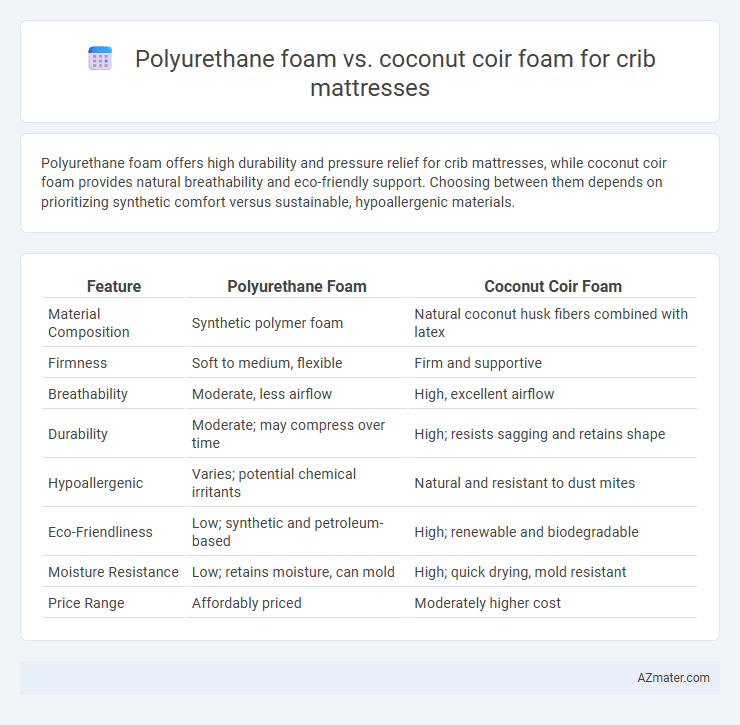Polyurethane foam offers high durability and pressure relief for crib mattresses, while coconut coir foam provides natural breathability and eco-friendly support. Choosing between them depends on prioritizing synthetic comfort versus sustainable, hypoallergenic materials.
Table of Comparison
| Feature | Polyurethane Foam | Coconut Coir Foam |
|---|---|---|
| Material Composition | Synthetic polymer foam | Natural coconut husk fibers combined with latex |
| Firmness | Soft to medium, flexible | Firm and supportive |
| Breathability | Moderate, less airflow | High, excellent airflow |
| Durability | Moderate; may compress over time | High; resists sagging and retains shape |
| Hypoallergenic | Varies; potential chemical irritants | Natural and resistant to dust mites |
| Eco-Friendliness | Low; synthetic and petroleum-based | High; renewable and biodegradable |
| Moisture Resistance | Low; retains moisture, can mold | High; quick drying, mold resistant |
| Price Range | Affordably priced | Moderately higher cost |
Introduction to Crib Mattress Materials
Polyurethane foam and coconut coir foam serve as popular materials in crib mattresses, each offering distinct benefits in terms of comfort and safety. Polyurethane foam, known for its durability and cushioning properties, provides consistent support and is widely used due to its affordability and ease of manufacturing. Coconut coir foam, derived from natural coconut fibers, is favored for its breathability, hypoallergenic qualities, and eco-friendly nature, making it an ideal choice for parents seeking organic and sustainable crib mattress options.
What is Polyurethane Foam?
Polyurethane foam is a synthetic material commonly used in crib mattresses for its cushioning and durability, made from polymer chains that create a flexible, supportive structure. It offers excellent pressure relief and resistance to wear, making it a popular choice for infant bedding. Compared to coconut coir foam, polyurethane foam tends to provide more consistent firmness and superior shock absorption properties.
What is Coconut Coir Foam?
Coconut coir foam is a natural, eco-friendly material made from the fibrous husks of coconuts, providing excellent breathability and moisture resistance for crib mattresses. Unlike polyurethane foam, coconut coir foam offers superior durability and hypoallergenic properties, making it ideal for infants prone to allergies or overheating. It also enhances airflow and supports spinal alignment, ensuring a safe and comfortable sleeping environment for babies.
Safety Considerations: Chemical & Allergen Exposure
Polyurethane foam used in crib mattresses often contains chemicals such as flame retardants and volatile organic compounds (VOCs) that may pose health risks to infants through off-gassing and skin contact. Coconut coir foam, being a natural and hypoallergenic material, reduces exposure to synthetic chemicals and allergens, making it a safer choice for sensitive babies prone to respiratory issues or skin irritations. Choosing coconut coir foam minimizes the risk of chemical toxicity and allergic reactions, promoting a healthier sleeping environment for infants.
Breathability and Temperature Regulation
Polyurethane foam offers moderate breathability but tends to retain heat, potentially causing discomfort in crib mattresses during warmer conditions. Coconut coir foam, made from natural coconut fibers, excels in breathability due to its open cell structure, promoting superior air circulation and enhanced temperature regulation. Choosing coconut coir foam supports a cooler, well-ventilated sleeping environment that reduces overheating risks for infants.
Support and Comfort Levels
Polyurethane foam offers consistent support and pressure relief, contouring closely to the baby's body to reduce the risk of pressure points, making it ideal for infants who need stable posture during sleep. Coconut coir foam provides firmer support with natural breathability and moisture-wicking properties, ensuring a cooler sleeping surface while maintaining structural integrity for long-term use. Combining these materials can optimize comfort and spinal alignment, balancing softness with the necessary firmness required in crib mattresses for safe infant sleep environments.
Durability and Longevity Comparison
Polyurethane foam offers strong durability with resistance to compression and maintains its shape well over years, making it a popular choice for crib mattresses. Coconut coir foam, made from natural coconut fibers, provides excellent longevity with natural breathability and resilience, reducing the risk of sagging or indentations over time. Both materials support prolonged use, but coconut coir foam stands out for its eco-friendly properties and sustained firmness without chemical degradation.
Eco-Friendliness and Sustainability
Polyurethane foam, derived from petroleum-based chemicals, poses environmental concerns due to its non-biodegradable nature and reliance on fossil fuels, whereas coconut coir foam is a natural, renewable resource made from coconut husk fibers, offering superior biodegradability and compostability. Coconut coir foam supports sustainability by reducing chemical off-gassing and providing excellent breathability and durability without synthetic additives. Choosing coconut coir foam for crib mattresses aligns with eco-friendly practices, minimizing environmental impact while promoting healthier indoor air quality for infants.
Cost Differences: Polyurethane vs Coconut Coir
Polyurethane foam for crib mattresses typically costs significantly less than coconut coir foam, with prices ranging from $20 to $60 per mattress compared to $50 to $100 for coir options. The lower production and material expenses make polyurethane foam a budget-friendly choice, while coconut coir's natural fibers and eco-friendly benefits increase its price. Consumers choosing coconut coir pay a premium for its chemical-free, breathable qualities, while polyurethane foam offers affordability with synthetic durability.
Which Mattress Material is Best for Your Baby?
Polyurethane foam offers excellent cushioning and durability, making it a popular choice for crib mattresses due to its ability to provide consistent support and resist allergens. Coconut coir foam, derived from natural coconut fibers, is highly breathable and hypoallergenic, promoting better airflow and reducing the risk of overheating and mold growth. For parents prioritizing natural materials and breathability, coconut coir foam is ideal, while polyurethane foam suits those seeking long-lasting comfort and easy maintenance.

Infographic: Polyurethane foam vs Coconut coir foam for Crib mattress
 azmater.com
azmater.com